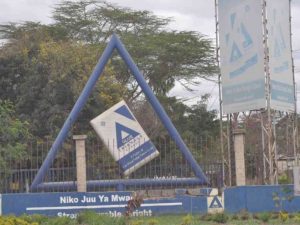Equity Group Records Ksh15.8 Billion Profit After Tax In Q3

Under a challenging operating environment, the Equity Group business model enabled it to report 8% growth in Profit After Tax for the third quarter to September 2018 to reach Ksh 15.8bn up from Ksh 14.6bn in 2017.
The operating environment in the last nine months was characterized by volatility in the business environment resulting in elevated inflation, continued interest rate capping causing a credit crunch, and a lowered Central Bank Rate which dipped the yield on loans.
A fortified liquid and agile balance sheet positioned the Group competitively in the uncertain operating environment while diversified revenue streams, geographic expansion, and structural efficiency gains enabled the Group to weather the effects of interest rates capping. The Group now has a liquidity ratio of 55%, non-funded income contributes 40%, subsidiaries contribute 18% of earnings and costs have declined by 4% over the past 1 year. Key in management strategy has been innovation and digitization of the Group which is now being rolled out to the subsidiaries, consolidating efficiency gains.
Equity Group has reported differentiated revenue growth of 1% to Ksh 49.3bn up from Ksh 48.7bn, despite the impact interest rates cap and the challenging operating environment have had on the banking sector. Non-funded income held strong to reach Ksh.19.8bn driven mainly by remittance commissions, trade finance, agency and credit card fees, and commissions.
“Equity Group business model has proven that the Group is not dependent only on the loan book income to drive shareholder value,” Equity Group Managing Director and CEO Dr. James Mwangi said and added: “We are reaping the benefits of a strong social brand that focuses on enhancing our relationship with the community through a shared prosperity approach to business. This, coupled with a staff force that is talented, passionate and committed to our shared vision of transforming the lives and livelihoods of our people gave the Group a strong foundation to confront and defy a perfect storm.”
In the year, the Group’s execution of the 3.0 Strategy of digitization through its digital suite of self-service tools known as Eazzy Banking continued to pay off. Third-party channels reported an exponential growth of customer activity, contributing over 97% of transaction volume. Eazzy Banking App grew by 208% to 168 million transactions from 55 million YoY and a value of Ksh 89bn from Ksh 52bn YoY. Eazzy Biz, which is a cash management solution for SMEs had a rapid adoption in the market that resulted in a growth of 148% YoY with a transaction value of Ksh 187.3bn from 90.9bn YoY.
Read: Cytonn Asset Managers Limited Holds A Training For Pension Trustees
The strategy of re-inventing the branches as relationship and wealth creation centres for our SMEs, corporates and high net worth individuals saw transaction value grow to Ksh 11.07bn from Ksh 11.06bn YoY, while transaction volumes declined from Ksh 14.4 million to Ksh 13.5 million as customers preferred to transact on the self-service channels.
Equitel’s transaction value grew by 20% to Ksh 425.1bn up from Ksh 353.6bn despite a slight decline in transactionvolumes to 185.4 million from 197.1 million YoY.
The agency network which has now grown to reach over 30,000 agents saw the transaction volume grow by 7% to 53.4 million from Ksh 49.8 million with value growing by 17% to Ksh 459.7bn from Ksh 391.3bn.
Diaspora remittances grew by 282% to Ksh 57bn from Ksh 15bn YoY due to an increased strategic partnership with payment partners including PayPal, Equity Direct, Western Union, MoneyGram, Wave and Swift.
Income from Treasury Operations increased by 18% to Ksh 15.7bn from Ksh 13.2bn YoY driven by an increase in government securities portfolio to Ksh 159bn from Ksh 128bn and increasing its contribution to the total income to 27%.
The Group’s strategy of regional expansion and business diversification resulted in a double-digit growth across the subsidiaries with an increased profit contribution (PBT) of 18% from 14% YoY, validating the Group’s decision to expand into the East and Central Africa region and diversify in financial services offering. Uganda PBT grew by 35%, Rwanda by 70%, DRC by 117%, South Sudan by 53%.
The Group’s 3.0 Strategy and differentiated business model saw total costs decline by 4% to Ksh 26.9bn from Ksh 28.0bn reflecting the consolidation of efficiency gains of innovation and digitization of business. Profit Before Tax grew by 8% to Ksh 22.4bn up from Ksh 20.7bn.
Total assets grew by 8% to Ksh 560.4bn up from Ksh 518.2bn YoY with net loans growing by 9% to Ksh 288.4bn up from Ksh 265.4bn while government securities grew by 24% to Ksh 159bn up from Ksh 128bn YoY.
“While the agile and liquid balance sheet positioned the Group defensively in the past, it now positions the Group competitively to take advantage of emerging opportunities at lower operational costs,” Dr. Mwangi commented.
The focus by the Group on the quality of the loan book saw Non-Performing Loans (NPLs) as at the end of the year close at 8.7% compared to 12.7% for the banking sector.
Deposits grew by 9% to Ksh 402.2bn from Ksh 368.8bn as the number of customers reached 12.7 million.
The Group has continued to invest in social impact investments. To date, Equity Bank has trained close to 1.66 million entrepreneurs including farmers, women, youth groups, and micro-, small- and medium-sized enterprises through various initiatives led by Equity Group in partnership with Mastercard Foundation and the International Labor Organization. 39,070 entrepreneurs have received a three-year entrepreneurship training and 600,000 small-scale peasant farmers have transformed into agribusiness through training while 2,616 medium scale farmers are being supported to transform through value addition.
The number of Wings to Fly beneficiaries reached over 15,000 at a cost of Ksh 15bn worth of comprehensive secondary school scholarships and leadership training. 5431 top performing KCSE scholars have benefited from Equity Bank’s University Paid Internship worth Ksh 2.08bn. The Equity Airlift to global leading universities has so far benefitted 465 university students at a cost of nearly Ksh 9.3bn through the Equity Leadership program.
The Group’s business model continues to be validated by rating agencies and recognition locally, regionally and globally. Moody’s gave the Bank a global rating of B2 with a stable outlook same as the sovereign rating of the Kenyan government due to the Bank’s strong brand recognition, solid liquidity buffers and resilient funding profile, established a domestic franchise and extensive adoption of digital and alternative distribution channels. The Global Credit Rating (GCR) maintained Equity’s investment grade AA- on long term and A1+ short term with a stable outlook.
Superbrand has for the last ten years in a row recognized Equity Bank as the Top Banking Superbrand in Kenya. The Banker Top 1000 World Banks ranked it 799 overall in its global ranking, 35th in soundness (Capital Assets to Assets ratio), 44th in terms of Return on Capital and 8th on Return on Assets. The Bank was also named the Best Retail Bank in Kenya and East Africa by the Banker Awards. In the Think Business Banking Awards 2018, the Bank won 24 awards out of its 24 entries; it emerged Best in 18 categories, including the Overall Best Bank in Kenya for the 7th year, and the Bank with The Lowest Charges to the individual. It was first runner-up in four categories and second runner-up in one category. The Banker East African Awards 2017 named the Bank the Best Retail Bank in Kenya and East Africa, the Best Bank in Corporate Social Responsibility in East Africa and the Best Digital Bank in Kenya.
The Group CEO Dr. James Mwangi was named the Chief Executive of the Year 2018 by Think Business banking awards, the East Africa CEO of the Year by the Banker Africa Awards 2018 and African Banker of the Year by the African Banker Awards 2018. The Bank also produced the Outstanding Young Banker of the Year in the Think Business Banking Awards for the second year in a row, denoting the Bank’s focus on internal talent development through coaching and mentoring.
Outlook
Equity Group has now completed its 3.0 strategy ahead of schedule with over 97% of all transactions migrated to digital. The rapid adoption of digital banking by customers is an indication that the Group has remained very responsive to the needs and aspirations of its existing and potential customers. “Our commitment to continuously listen to our customers has meant that we constantly disrupt ourselves through innovation. This way, we remain relevant to our customers. We have also increased our internal capability to deliver digital banking by adopting predictive capabilities to inform our futuristic innovations. We believe that the future of banking is predictive capability based on data analytics and artificial intelligence and this is where we have set our eyes as a Group,” said Dr. Mwangi.





